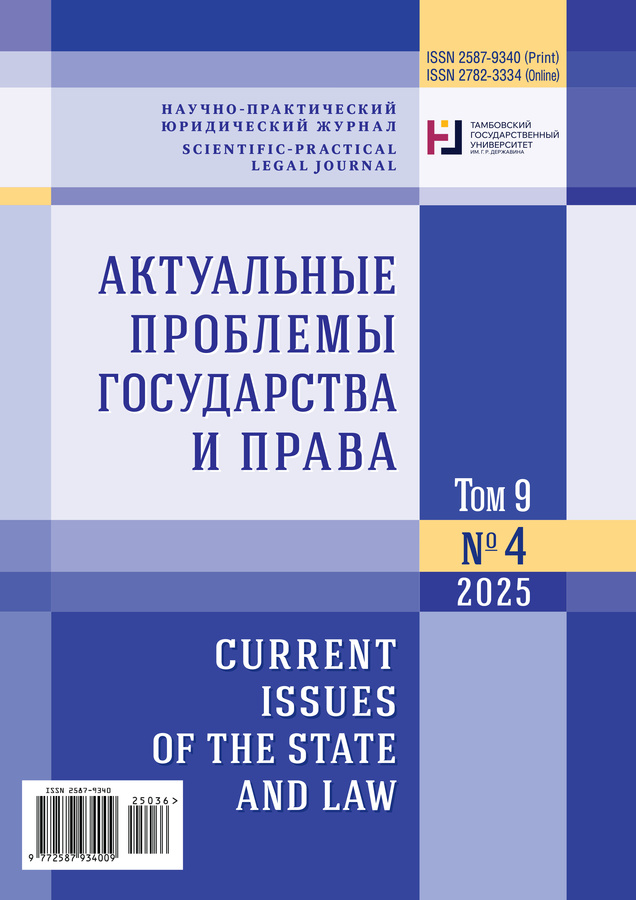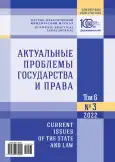Актуальные вопросы постановки на профилактический учет лидеров и активных участников группировок отрицательной направленности
- Авторы: МОРОЗОВ А.С.1
-
Учреждения:
- ФКОУ ВО «Кузбасский институт Федеральной службы исполнения наказаний России»
- Выпуск: Том 6, № 3 (2022)
- Страницы: 371-380
- Раздел: Материальное право
- URL: https://journal-vniispk.ru/2587-9340/article/view/303831
- ID: 303831
Цитировать
Аннотация
Введение (постановка проблемы): Ежегодно на профилактическом учете в учреждениях уголовно-исполнительной системы в качестве лидеров и активных участников группировок отрицательной направленности состоят около полутора тысяч осужденных и лиц, заключенных под стражу, являющихся потенциальными субъектами уголовной ответственности по статье 210.1 УК РФ «Занятие высшего положения в преступной иерархии». Гипотеза исследования состоит в том, что наличие признаков лица, характеризующих его как лидера или активного участника группировок отрицательной направленности, является достаточным основанием не только постановки на профилактический учет, но и возбуждения уголовного дела в отношении такого лица по статье 210.1 УК РФ. Более того, постановка на профилактический учет представляется незначительной мерой для профилактики деятельности лица, совершающего преступление. Обозначается проблема отсутствия легальной дефиниции понятия «группировка отрицательной направленности», «лицо, занимающее высшее положение в преступной иерархии». Предметом исследования выступила статья 210.1 УК РФ и Приказ Минюста РФ от 20 мая 2013 г. № 72 «Об утверждении Инструкции по профилактике правонарушений среди лиц, содержащихся в учреждениях уголовно-исполнительной системы». В рамках доказательства гипотезы была поставлена цель проведения сравнительного анализа признаков лица, являющегося лидером или активным участником группировки отрицательной направленности и лица, занимающего высшее положение в преступной иерархии. Задачи исследования базировались на его цели, а именно, состояли в сопоставлении признаков «лидер» и «высшее положение»; «группировка отрицательной направленности» и «преступная иерархия». Основными методами исследования стали формально-юридический метод, позволивший употреблять понятия в их легальном значении, сравнительный анализ, применявшийся при сопоставлении исследуемых категорий и выявлении общих и отличительных признаков, а также метод правового прогнозирования, позволивший предположить, какого рода последствия наступят в случае внесения или не внесения изменений в правовое регулирование рассматриваемых отношений. Основными научными результатами исследования стало подтверждение научной гипотезы, поставленной в начале исследования, а именно: подтверждение факта тождественности категорий «лидер и активный участник группировки отрицательной направленности» и «лицо, занимающее высшее положение в преступной иерархии», что позволит правоохранительным органам возбуждать уголовные дела по статье 210.1 УК РФ в отношении лиц, поставленных на профилактический учет в качестве лидеров и активных участников группировок отрицательной направленности.
Об авторах
Алексей Сергеевич МОРОЗОВ
ФКОУ ВО «Кузбасский институт Федеральной службы исполнения наказаний России»
Автор, ответственный за переписку.
Email: morozovlalex@yandex.ru
ORCID iD: 0000-0002-6621-7160
доцент кафедры организации режима, охраны и конвоирования
Россия, Российская Федерация, 654066 г. Новокузнецк, просп. Октябрьский, 49Список литературы
- Белая И.П., Захарченко С.Н., Казак Б.Б. Организационно-правовые аспекты противодействия лидерам уголовно-преступной среды, отбывающих наказания в исправительных учреждениях и уголовно-исполнительных инспекциях // Юридическая мысль. 2019. № 2-3 (112-113). С. 83-89.
- Иринчеев В.В. Некоторые аспекты детерминации формирования групп осужденных отрицательной направленности в местах лишения свободы // Вестник Бурятского государственного университета. 2015. № 2 (2). С. 252-256.
- Дакашев И.Х. Профилактика негативного влияния лидеров и активных участников группировок отрицательной направленности на положительно характеризующихся осужденных в исправительных учреждениях // Вестник Самарского юридического института. 2021. № 1 (42). С. 40-45.
- Тулегенов В.В. Личность неформального лидера: понятие, социальное взаимодействие, типология и предупреждение // Вестник Владимирского юридического института. 2013. № 2 (27). С. 29-37.
- Фильченко А.П., Пономарев С.А. О необходимости изменения подхода к профилактическому учету осужденных // Ведомости уголовно-исполнительной системы. 2016. № 11. С. 28-34.
- Федореев П.Р. Отрицательно характеризующиеся осужденные в местах лишения свободы: дис. … канд. юрид. наук. Рязань, 2005. 170 с.
- Кутякин С.А. Влияние «воров в законе» на криминологическую ситуацию в исправительных учреждениях // Уголовно-исполнительное право. 2014. № 2 (18). С. 65-70.
- Сенатов А.В. Понятие и характеристика группировок отрицательной направленности, находящихся в учреждениях уголовно-исполнительной системы // Пенитенциарное право: юридическая теория и правоприменительная практика. 2021. № 2 (28). С. 66-70.
- Барабанов Н.П., Михайлин В.В., Моисеев Н.Д. Понятийная характеристика криминальной субкультуры осужденных // Уголовно-исполнительное право. 2015. № 3 (21). С. 16-24.
- Барабанов Н.П. Криминальная субкультура осужденных в исправительных учреждениях: «Воры в законе», «воровские группировки», лидеры уголовно-преступной среды, криминальные «авторитеты» // Уголовно-исполнительное право. 2015. № 1 (19). С. 17-25.
- Григорьев Д.А., Морозов В.И. Как определить лицо, занимающее высшее положение в преступной иерархии? // Юридическая наука и правоохранительная практика. 2014. № 4 (30). С. 50-58.
- Качалов С.Ю. Криминальные авторитеты современной России: тенденции и проблемы // Научный портал МВД России. 2009. № 2 (6). С. 56-63.
- Рагулин А., Фефелов В. О понятии лица, занимающего высшее положение в преступной иерархии // Уголовное право. 2010. № 5. С. 67-70.
- Дымов Г.А. Криминальная субкультура как элемент организованной преступности в России // Вестник Владимирского юридического института. 2012. № 1 (22). С. 83-85.
- Кутякин С.А. Влияние «воров в законе» на криминологическую ситуацию в исправительных учреждениях // Уголовно-исполнительное право. 2014. № 2 (18). С. 65-70.
- Емельянова А.Г. К вопросу о совершенствовании профилактики преступлений в местах лишения свободы // Вестник Кузбасского института. 2018. № 3 (36). С. 22-28.
- Южанин В.Е. Профилактическая функция изоляции осужденных к лишению свободы (теоретические проблемы) // Вестник Кузбасского института. 2020. № 3 (44). С. 83-92.
Дополнительные файлы









